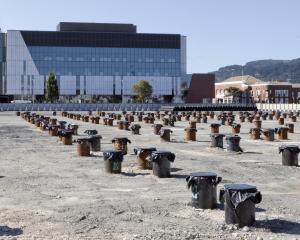
New Zealand Aluminium Smelters (NZAS) has signed 20-year electricity arrangements that secure the future of the Tiwai Point aluminium smelter near Bluff to continue producing high-purity, low-carbon metal, backed by a diversified mix of renewable electricity from the South Island.
NZAS, which owns and operates Tiwai Point, has signed contracts with electricity generators Meridian Energy, Contact Energy and Mercury NZ to set pricing for an aggregate of 572MW of electricity to meet the smelter’s full electricity needs.
Southland District Mayor Rob Scott said it was "great to have that certainty".
"For a long time it was up in the air — I had given up guessing what was going to happen to the smelter.
"This deal is good news for our economy, both for Southland and New Zealand."
Invercargill Mayor Nobby Clark said the smelter directly employed about 800 people, and supported an additional 2500 jobs in the region.
"This news that it’s not going to shut down is probably the best day I've had in politics.
"This deal solidifies the next 20 years for the region’s development and addresses the issue of renewable energy.
"If Tiwai were to close, there would have been a glut of energy. Now that Tiwai is saved, renewable energy projects in the region can go ahead with certainty."
The southern green hydrogen project and several wind farm projects could now go ahead, Mr Clark said.
Yesterday’s announcement ends a protracted series of negotiations which had left the future of the smelter in doubt.
In July 2020, NZAS major shareholder Rio Tinto gave notice it was terminating the contract with Meridian for the smelter, with effect from August 2021, but in January 2021, Rio Tinto accepted new short-term "staged exit" contract terms offered by Meridian, effective from that date through to December 2024.
In July 2022, Meridian noted NZAS’ statement that it had begun exploring potential pathways for the smelter to remain operational after December 2024 and announced it would engage in contract negotiations with NZAS as part of the process
As part of the new contracts, the Tiwai smelter will make up to 185MW of electricity available to the national grid in times of severe shortage as a result of a new set of demand response contracts concluded with energy generators.
The contract term is 20 years to December 31, 2044.
Southland Business Chamber chief executive Sheree Carey said the security of the smelter's operations had significant implications for Southland's economy, employment opportunities and community wellbeing.
"It ensures stability for the hard-working staff and suppliers who rely on the smelter for their livelihoods, fostering a sense of confidence and resilience in the region.
Southland MP Joseph Mooney said certainty for Tiwai was also very positive for New Zealand, with the smelter effectively becoming the biggest battery in the country, providing 20%-25% of what the proposed Lake Onslow pumped hydro scheme would have.
Environment Southland chairman Nicol Horrell said the announcement was positive news for Southland.
"I’m pleased for the employees at Tiwai and the Southland businesses who work with it. Economically, it’s good for Southland to have the security of the longer-term energy supply.
“Environmentally, the smelter has made some steady progress towards environmental improve-ments and we look forward to continuing our relationship with them to ensure the site meets appropriate environmental standards.”
Meridian Energy chief executive Neal Barclay said the agreement was an excellent result after many years of hard work.
"This new package of contracts is commercially sustainable and delivers value for our shareholders, so we are talking a real win-win here.
"The NZAS decision to extend the smelter life removes significant uncertainty for the electricity sector, which also helps pave the way for new renewable energy to be built.”
Otago Energy Research co-director Associate Prof Michael Jack said the agreement was "momentous" and could lead to power prices fluctuating less frequently.
"It reduces the chances of outages.
"Tiwai Point aluminum smelter can drop their demand when the electricity system requires it to do so. Because they can do that they can deal with the variability that comes from renewable electricity."













